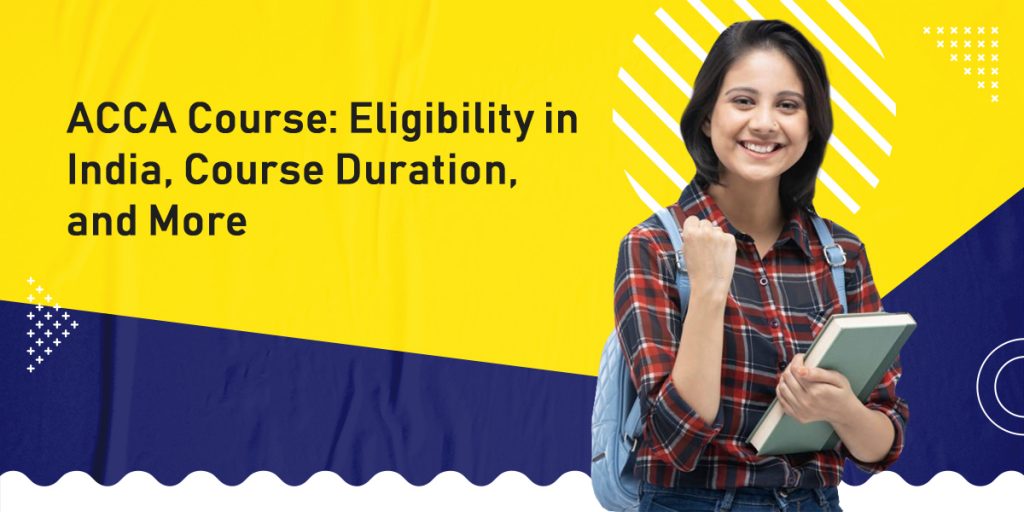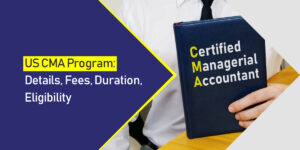ACCA Course: Eligibility in India, Course Duration, and More

Earning the Association of Chartered Certified Accountants, certification is an excellent option for those looking to advance their accounting career. With so much interest in the ACCA, it can be challenging to determine which program is the best fit for your future. We are here to help you navigate this decision.
From the curriculum and cost of the program, to guaranteed job placement and more, this guide provides all the information you need to know about the US CMA Prep Course. This will help you make an informed decision and choose the program that is right for your career goals and aspirations.
What is ACCA:
The ACCA, or Association of Chartered Certified Accountants, is a globally recognized accounting program recognized in over 180 countries. The UK-based course can be completed in one or two years, depending on the study pace and exemptions. The program covers fundamental accounting topics such as taxes, auditing, financial reporting, and strategic business reporting, and offers a global perspective on chartered accountancy, equipping students with the skills needed to become a global chartered accountants.
ACCA is one of the most promising accounting courses to date around the world. ACCA certification depicts that the professional has significant knowledge in areas of tax, and audit. ACCA is controlled by the Association of Chartered Certified Accountants (ACCA) and is United Kingdom-based. ACCA being a UK-based certification has more value in commonwealth countries.
As an ACCA professional, the job role mainly is concentrated on business taxation, financial statements, management accounting, law, and business ethics.
| Criteria | ACCA |
| Certificate Issuer | Association of Chartered Certified Accountants (ACCA) |
| Eligibility | 12th pass with a minimum of 60% |
| Course Duration | 2 to 3 Years |
| Pass rate | 40% to 50% |
| Job Titles | Management ConsultantBusiness AnalystAuditor Tax consultant Subject Matter expert |
| Pattern | Three Levels, Applied knowledge level Applied Skill level Strategic Professional Level (Essential) Strategic Professional Level (options) |
| No of Papers | 13 Papers |
| Recognition | Global |
ACCA Eligibility:

In order to be eligible for the ACCA Exam Candidate must:
- 12th passed out with a minimum of 65% in at least two subjects and scored a minimum of 50% in the remaining subjects.
- To qualify as an ACCA, a minimum of 3 years of continuous work experience is a prerequisite as per rules mentioned by the Association of Chartered Certified Accountants (ACCA) Institute.
- But it is not a must that you have these 3-year experience before you qualify for your ACCA exams. Students preparing for ACCA can gain experience after clearing all ACCA papers as an ACCA Affiliate
ACCA Exam Pattern:

ACCA certification offered by the Association of Chartered Certified Accountants (ACCA) has 2 levels or modules.
- Fundamentals
- Professionals
The fundamentals level will have a total of 9 papers. These 9 papers or subjects are divided into two more modules
- Knowledge level/ Module – Three papers
- Skill level/ Module – Six papers
Knowledge Module:
- F1 – Accountant in Business
- F2 – Management Accounting
- F3 – Financial Accounting
Skills Level/ Module:
- F4 – Corporate and Business Law
- F5 – Performance Management
- F6 – Taxation
- F7 – Financial Reporting
- F8 – Audit and Assurance
- F9 – Financial Management
The professional module/ level will have two modules.
- Essentials – 3 papers
- Options – 4 Papers
Essentials:
- P1 – Governance, Risk, and Ethics
- P2 – Corporate Reporting
- P3 – Business Analysis
Options (two to be completed)
- P4 – Advanced Financial Management
- P5 – Advanced Performance Management
- P6 – Advanced Taxation
- P7 – Advanced Audit and Assurance
Each Paper has two sections in the exam:
- Section A – MCQ questions based on scenarios
- Section B- Individual questions based on subjects
The first four exams in ACCA are to be taken on demand. You can book a slot with an approved ACCA CBE center any time of the year or whenever you feel ready for the test.
The remaining nine exams will be conducted 4 times a year in the following months
- March
- June
- September
- December
ACCA Exam Dates:

Exam dates for the ACCA are offered in four cycles or sessions. The dates for the March, June, September, and December sessions are shown here.
March 2023 Session:
| Date | Topics |
| March 6, 2023 | Audit and Assurance (AA), Advanced Audit and Assurance (AAA) |
| March 7, 2023 | Taxation (TX), Advanced Taxation (ATX), Strategic Business Leader (SBL) |
| March 8, 2023 | Performance Management (PM), Advanced Performance Management (APM), Advanced Taxation |
| March 9, 2023 | Financial Reporting (FR), Strategic Business Reporting (SBR) |
| March 10, 2023 | Financial Management, Advanced Financial Management (AFM), Corporate and Business Law (LW) |
June 2023 Session:
| Date | Topics |
| June 5, 2023 | Audit and Assurance (AA), Advanced Audit and Assurance (AAA) |
| June 6, 2023 | Taxation (TX), Advanced Taxation (ATX), Strategic Business Leader (SBL) |
| June 7, 2023 | Performance Management (PM), Advanced Performance Management (APM), Advanced Taxation |
| June 8, 2023 | Financial Reporting (FR), Strategic Business Reporting (SBR) |
| June 9, 2023 | Financial Management, Advanced Financial Management (AFM), Corporate and Business Law (LW) |
September 2023 Session:
| Date | Topics |
| September 4, 2023 | Audit and Assurance (AA), Advanced Audit and Assurance (AAA) |
| September 5, 2023 | Taxation (TX), Advanced Taxation (ATX), Strategic Business Leader (SBL) |
| September 6, 2023 | Performance Management (PM), Advanced Performance Management (APM), Advanced Taxation |
| September 7, 2023 | Financial Reporting (FR), Strategic Business Reporting (SBR) |
| September 8, 2023 | Financial Management, Advanced Financial Management (AFM), Corporate and Business Law (LW) |
December 2023 session schedule is yet to be announced.
ACCA Exam Syllabus:
| ACCA Levels | Particulars |
| Foundations in Accountancy | ACCA Diploma in Financial and Management Accounting (RQF Level 2) ACCA Diploma in Financial and Management Accounting (RQF Level 3) ACCA Diploma in Accounting and Business (RQF Level 4) Certified Accounting Technician (CAT) |
| Knowledge Level | Business & Technology Management Accounting Financial Accounting |
| Skill Level | Corporate and Business Law (LW) Taxation (TX) Performance Management (PM) Financial Reporting (FR) Audit and Assurance (AA) Financial Management (FM) |
| Professional Level | Strategic Business Leader (SBL) Strategic Business Reporting (SBR) |
| Optional Subjects in the Professional Level | Advanced Financial Management (AFM) Advanced Performance Management (APM) Advanced Taxation (ATX) Advanced Audit and Assurance (AAA) |
ACCA Course Fee:

| Particulars | Fees (INR) |
| Initial Registration | 2,700 |
| Annual subscription | 10,440 |
| Knowledge Level | 22,680 |
| Skill Level | 69,660 |
| Professional Level | 64,170 |
| Total | 1,69,650 |
ACCA Skill Set:
The comprehensive ACCA programme provides in-depth understanding of accounting and financial fundamentals. It also contains management, strategic, and analytic components, all of which are required for success in any field of accounting.
When you fulfil the ACCA standards, your CV becomes more valuable, and you’ll be capable of looking into a variety of high-level work chances. The possibilities of being employed at the senior strategic management level in multinational organisations are also increasing.

Because of your ACCA certificate, your earning potential has grown and you may negotiate a better wage. Obviously, your salary will not increase overnight, but you will be in a better position and deserving of higher-paying employment.
These advantages are quite appealing, but there is a catch. You will also need to develop the ACCA qualification.
Summary of the Skillset of an ACCA professional:
- Critical Thinking
- Decision making
- Technical Skills
Critical Thinking: As automation technologies continue to advance, many of the manual tasks traditionally performed by accountants are becoming obsolete. Instead, ACCA students will be focused on developing critical thinking skills and participating in projects that require analytical and strategic thinking.
In the future, accountants will not just be analyzing numbers on a spreadsheet, but also providing real-time reporting, predictive analysis, insights, and strategic thinking to business partners. This will be vital in helping companies make proactive decisions and stay ahead of the competition. ACCA students will be equipped with the knowledge and skills necessary to provide the analysis and assessments that companies need to make informed decisions.
Proactive decisions based on critical thinking will assist drive the firm on the proper path. Accountants will give the analysis and assessment that firms require to stay ahead of the competition.
Decision Making: When it comes to judgment and decision-making, humans continue to have an advantage over robots. ACCA students must maintain their acute judgment and prepare to make critical judgments in their accounting professions throughout the following decade.
Financial reporting is evolving and now includes both non-financial and financial information. This provides businesses and investors with a more accurate view of overall company performance.
ACCA students will get more information regarding the expenses of the running company in the future. They will be required to evaluate the data in the reports and make judgments about the company’s future health.
Accountants will be required to make hard judgments based on the overall corporate picture rather than simply the financial data on their spreadsheet.

Technical Skills: Accounting technology and automation have been some of the most significant changes that accountants have had to make. Over the next decade, digital technology is expected to have the greatest influence on the sector.
ACCA accountants will use cloud-based technologies more than their predecessors. Manual operations such as bookkeeping and expenditure processing can be replaced by software solutions. Furthermore, adopting software helps automate the financial closing process.
Emerging accountants will undertake fewer data-entry activities and will instead need to be software masters. Auditors are particularly affected. It won’t be long until technologies take over most of the manual labor that auditors have been performing, such as matching invoices and payments and validating transaction existence.
Salary and Career Opportunities of ACCA:

Getting an ACCA certification gives you tons of career opportunities and paths to choose from. From the option of choosing to go for a master’s degree, start your own business or step into the conglomerates, the possibilities for ACCA professionals are endless.
Based on the industry, job title, and sector you desire to work in, ACCA professionals will have plenty of job titles to opt from.
Here is the list of job titles that are in trend and most opted for by ACCA professionals:
- Management Consultant
- Business Analyst
- Auditor
- Tax consultant
- Subject Matter expert
- Financial Accountant
- Corporate Treasurer
- Forensic Accountant
- Business owner
- Financial Analyst
- Credit Controller
With increased globalization, the scope of ACCA will expand significantly in the future. Companies from all around the world offer services and goods. The following are the major ACCA scopes:
- ACCA is accepted in over 180 countries, making it one of the most valuable credentials. The majority of ACCA professionals from India work in nations like the United Kingdom, Australia, Singapore, and Germany.
- ACCA professionals are in high demand among foreign corporations operating in India. They recruit multinational accounting specialists that are competent for international jobs. They must be able to deal with US GAAP as well as IFRS.
- An ACCA’s work responsibilities are the same as those of a CA. An ACCA professional may also be able to conduct the same type of work.
ACCA Salary:
The income after ACCA is heavily influenced by the length of job experience. ACCA students begin their careers with a salary of roughly INR 7 LPA, which grows to more than 15 LPA with experience. BDO, Grant Thornton, J. P. Morgan, and Morgan Stanley are among the leading accounting and finance firms that recruit ACCAs.
| Job | Salary (INR) |
| Accountant | 3,50,000 |
| Chartered Accountant | 9,50,000 |
| Finance Manager | 9,60,000 |
| Auditor | 6,25,000 |
| Associate Auditor | 3,70,000 |
ACCA Pass Rates
In the June sitting, 101,866 students took part, resulting in 122,756 exams being completed. Out of these, 3,877 students passed their final exams and became ACCA Affiliates. The option of remote invigilation continues to be well-received, with an increasing number of students, 15,474, opting for it.
The ACCA Qualification is designed to evaluate the skills, abilities, and competencies necessary for a successful and ethical career as a modern-day accountant. It emphasizes ethics and professionalism, providing students with a strong foundation for a rewarding career as qualified finance professionals. The results also include exams taken through ACCA’s on-demand program for Foundation Diplomas, Applied Knowledge, and Law exams, which totaled 33,474 exams, with over 1,978 of them being conducted through remote invigilation.
| ACCA Qualification | Pass rate (%) |
| Applied Knowledge | |
| BT – Business & Technology | 85 |
| FA – Financial Accounting | 69 |
| MA – Management Accounting | 64 |
| Applied Skills | |
| LW – Corporate and Business Law | 82 |
| TX – Taxation | 52 |
| FR – Financial Reporting | 51 |
| PM – Performance Management | 41 |
| FM – Financial Management | 52 |
| AA – Audit and Assurance | 39 |
| Strategic Professional – Essentials | |
| SBL – Strategic Business Leader | 50 |
| SBR – Strategic Business Reporting | 49 |
| Strategic Professional – Options | |
| AAA – Advanced Audit and Assurance | 31 |
| AFM – Advanced Financial Management | 41 |
| APM – Advanced Performance Management | 33 |
| ATX – Advanced Taxation | 42 |
| Foundation Level Qualifications | Pass rate (%) |
| ACCA Diploma in Financial and Management Accounting (Level 2 RQF) | |
| FA1 – Recording Financial transactions | 74 |
| MA1 – Management Information | 71 |
| ACCA Diploma in Financial and Management Accounting (Level 3 RQF) | |
| FA2 – Maintaining Financial Records | 73 |
| MA2 – Managing Costs and Finance | 72 |
| ACCA Diploma in Accounting and Business (Level 4 RQF) | |
| FBT – Business & Technology | 77 |
| FFA – Financial Accounting | 73 |
| FMA – Management Accounting | 72 |
| Foundation Specialist Certificates (RQF Level 4) | |
| FAU Foundations in Audit | 31 |
| FTX Foundations in Taxation | 49 |
| FFM Foundations in Financial Management | 40 |
FIA (Foundation in Accountancy) in ACCA?
ACCA FIA (Foundation in Accountancy) is a set of entry-level qualifications developed by ACCA for candidates who do not meet the required eligibility for taking the ACCA.
Candidates Eligible for ACCA FIA:
- Candidates who do not have more than 65% in math, English, and accounting and over 50% in other subjects in their 12th.
- Candidates who are from arts and science background without math or accounts subject in their 12th
- Candidates still doing their 12th can also take the ACCA FIA route.
So, the ACCA FIA route is for these candidates who want to pursue ACCA but have not met the ACCA eligibility criteria.
ACCA FIA will require the candidates give 7 additional exams before they take Paper I of ACCA. On the contrary, Candidates taking the ACCA will start with Paper I.
Out of the 7 additional exams ACCA FIA candidates have to take, three exams are mandatory and four exams are optional.
Three exams mandatory for ACCA FIA candidates are:
- FAB- Accountant in Business
- FMA- Management Accounting
- FFA- Financial Accounting
So, here the advantage of taking ACCA FIA is that these above three exams are similar to Papers – I, II, and III taken by ACCA candidates. So once ACCA FIA candidate completes taking these three exams, they can start their ACCA by taking Paper IV directly.
Reasons to Study ACCA Course:
- ACCA provides students with an internationally recognized credential, making them eligible for job opportunities in over 180 markets and recognized by 80 international organizations.
- The program is highly sought after by the top four multinational corporations, with the potential to work in senior, strategically significant positions.
- It is also one of the most cost-effective ways to obtain an International Professional Qualification.
- Coordinated from the UK, ACCA has 100 offices worldwide that provide local support, including education on local laws and taxes, making the course relevant in any country.
- The program also offers flexibility, allowing students to pursue their ACCA certification while completing their undergraduate studies.
FAQ on ACCA Course:
Can a student take the ACCA qualification in any order?
The ACCA certification has 13 exams/papers based on 13 subjects divided into 4 modules.
- Applied knowledge level
- Applied Skill level
- Strategic Professional Level (Essential)
- Strategic Professional Level (options)
Candidates have to take exams in one module after the other in order as per the above lists. But within the modules, ACCA does not have any rules on the order of the subjects to be attempted. It is entirely up to the candidate to select which subject to take first.
ACCA candidates will be allowed to take 4 exams in a single cycle among the 8 exams allowed in course of the calendar year. ACCA tests are conducted in 4 examination cycles every year in March, June, September, and December months.
Is it compulsory to complete work experience to qualify as ACCA?
To qualify as an ACCA, a minimum of 3 years of continuous work experience is a prerequisite as per rules mentioned by the Association of Chartered Certified Accountants (ACCA) Institute.
But it is not a must that you have these 3-year experience before you qualify your ACCA exams. Students preparing for ACCA can gain experience after clearing all ACCA papers as an ACCA Affiliate.
Is there any time limit for completing the ACCA Course?
Yes, there is a time limit for completing your ACCA course. ACCA certification offered by the Association of Chartered Certified Accountants (ACCA) has 4 levels or modules.
- Applied knowledge level
- Applied Skill level
- Strategic Professional Level (Essential)
- Strategic Professional Level (options)
Candidates need to follow the seven-year rule to complete their strategic professional exams, which means they have to clear all the strategic professional module papers within seven years from the time they clear their first strategic professional paper and reach the ACCA Affiliate status.
If the candidate fails to do so in the span of seven years, all the papers must be taken again in order to get the ACCA certification.
Completing all your papers within this stipulated time puts you at advantage during the placements, as it shows the hiring companies your dedication and commitment to becoming an ACCA professional.
Does ACCA have any negative markings?
No, there is no negative marking for ACCA exam grading either for MCQ-type questions or for essay-type questions. This gives an advantage to the candidates and there will be a possibility of answering all the MCQs without the concern of answers being wrong.
So, it is advised that candidates answer every MCQ-type question, even though they are not sure of the answer, as it increases your probability of improving your final score.





